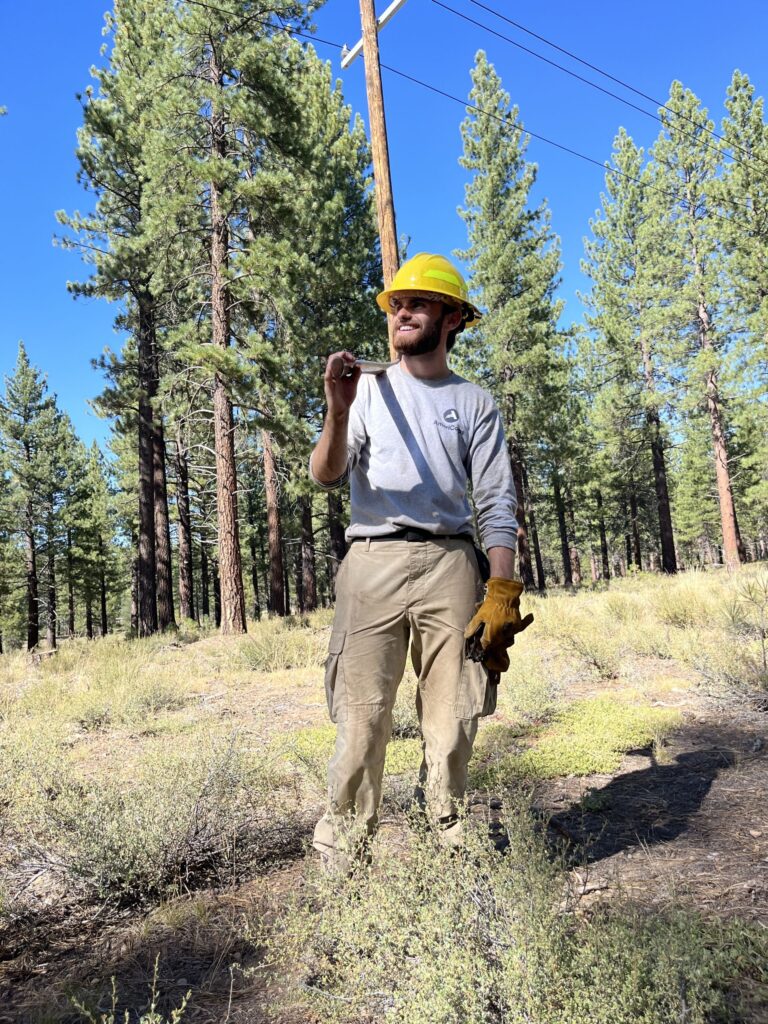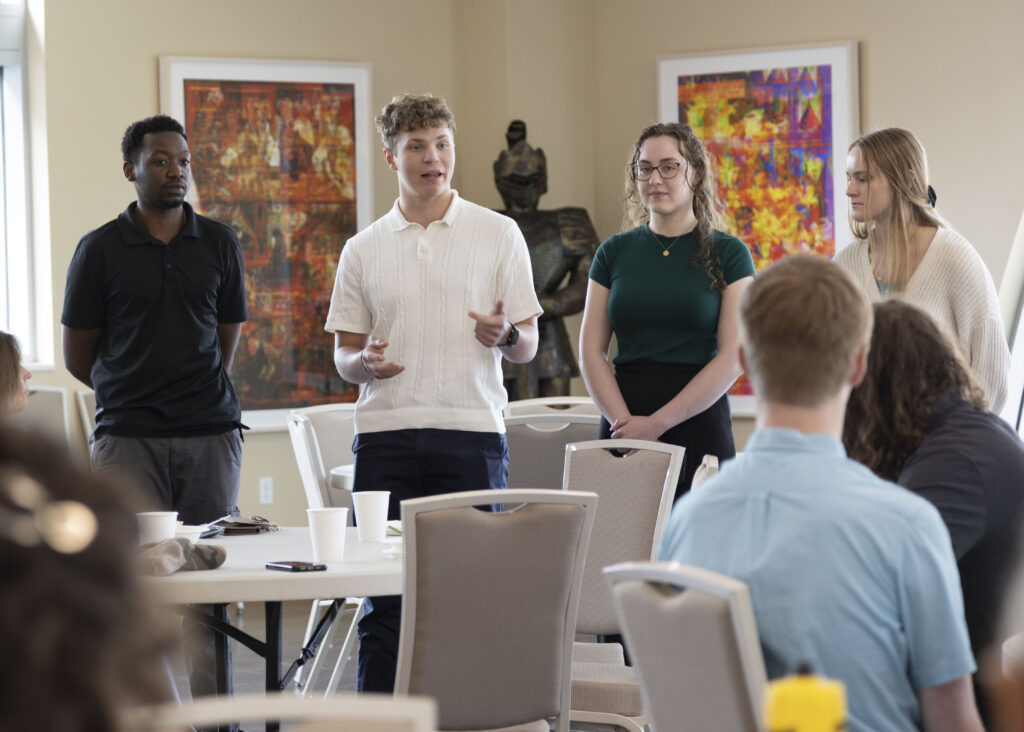Author explains how economics shapes politics

A sizeable crowd (large photo above the headline) turned out in Dion Family Student Center Roy Room Tuesday to hear a lecture by economist-author Charles Wheelan (photo directly above). The large photo shows inductees into Omnicron Delta Epsilon, the international ecnomics honors society, with names just above the photo.
Economics drives our nation’s politics in powerful, specific ways, a prominent Dartmouth economist-author asserted with examples during a lecture in the Dion Family Student Center Tuesday.
Charles Wheelan, PhD, Senior Fellow and Lecturer at Dartmouth’s Rockefeller Institute and one of the leading popularizers of economics theory and public policy in America today, is best known for his books that make economics accessible to the general public — notably Naked Economics and Naked Statistics. In his late-afternoon talk to nearly 150 people who included President Jack Neuhauser, VPAA Karen Talentino, many students and all of the economics faculty, the speaker laid out five ways that he believes economic issues are affecting U.S. political fortunes.
Wheelan’s lecture, sponsored by the Saint Michael’s Economics Department and titled “Economic ideas that matter: Five economic trends that will shape our lives in the coming decades,” was in honor of the inductees into the Saint Michael’s Chapter of Omicron Delta Epsilon, the international economics honors society.
The first factor motivating our politics put forth by Wheelan “that you need to care about” the speaker labeled “tectonic changes in the labor market” (PowerPoint slides accompanied his talk.) Much about those tectonic changes stems from technology that displaces low-skilled workers, such as secretaries or ticket-takers or supermarket clerks. “If you ask economists what’s the biggest force for job destruction, it’s far and away technology,” he said – but “that’s not an easy political target,” so politicians typically instead go after immigration (and its relatively far lesser effects on the demand for domestic labor).
Trade and globalization are another aspect of recent major labor market changes – he gave the example of China and India introducing hundreds of millions of relatively low-skill workers to the international economy in recent decades and affecting wages while providing lower-cost items for the high-skilled workers, meaning the gap between “haves” and “have-nots” keeps growing. In our times over recent decades, “top performers” in any field now command huge salaries as never before – in realms like sports, movies, medicine – while in the past, for instance, a studio or team or hospital would just be able to pay those professionals a far lower salary, since they were essentially just another “owned” corporate asset with less independent leverage than in today’s market.
Wheelan talked about minimum wage proposals and politicians “railing at the most vulnerable forces” as some recent ways these issues have been addressed – but these issues are not so easy to solve, practically speaking, since both of those approaches have inherent flaws in his view that he covered in some detail. Even the phenomenon of “assortative mating” – more skilled workers mating with one another and widening the worker-skills gap – is a major factor affecting the economy, said Wheelan, who spoke of “hereditary meritocracy – “your parents are passing something down to you” beyond just money or houses and horses when they pass on literacy and education, which enormously impact the job market and economy. He showed a map that dramatized “agglomeration effects” where “highly skilled people are more successful when around other highly skilled people,” so they congregate more and more around metro areas. This diminishes the economies in more rural areas across the board, he seemed to be suggesting.
The second fiscal situation moving U.S politics in a powerful way, he said, is the enormous and growing amount of federal debt held by the public. He showed graphs dramatizing the alarming trend in the past century or so. “It’s a potentially destabilizing situation, but gets little attention,” he said, though it should since young people in particular stand to inherit the inevitable higher prices and interest rate. “All this that we pay on the debt is nonproductive spending – it’s interest,” he said — rather than more productive spending such as on infrastructure or housing, or things that might boost the economy. However, Wheelan sees “no political will to pay this [debt] down” in recent years.
His third major economic area that he feels is strongly affecting politics centers on the question “Can we put a price on carbon?” He said, “It seems all economists love the carbon tax,” and it’s easy to see why –“it’s a tax that gets you to a more efficient outcome and addresses an adverse effect to society” (pollution), similar to with smoking and taxes on cigarettes. But it’s a hard sell on such measures that address long-term issues, as he found when he ran for Congress from Illinois some years ago on such a platform and did not have a strong showing. But he favors the approach: “Tax the things that you don’t like,” he said, calling it “as beautiful a policy as you’ll find.” “This is where [needed revenues] should come from” and it would address pressing environmental issues at the same time, he said.
Wheelan’s fourth point about the politics-economics nexus was what he termed the extraordinary potential of behavioral economics. “People get paralyzed by choices,” he said, and don’t always behave as an economic model might have predicted based on strictly “rational” choices, as studies show more and more. The net effect is the aggregation of little things, he said, such as not saving enough for retirement – so, harnessing what are learning about behavioral economics might strengthen the economy, via astute incentives to productive behaviors based on insights of behavioral economics studies — from savings to the environment to health.
The speaker titled his fifth point “It’s worse than you think!” – Worse, he said, because of the growing polarization between “red” and “blue” in politics. “Many worry we’ve lost the capacity to govern,” he said, with less and less overlap between red and blue, resulting in “political trench warfare.” As a result, he suggested, we are unable to get things done that we really need to get done – things that American politicians formerly largely did get done, in a bygone, more centrist and cooperative era. In the fiscal realm, “if you don’t do anything, the debt keeps going up”; also serious carbon-related problems in the economy and society accelerate. Meanwhile in major economic areas like healthcare we “whipsaw back and forth,” as with the Affordable Care Act passage/repeal, and it’s all “deeply problematic,” since “this is how we take action on many policy ideas” traditionally – through political action (at least when politics are more functional). “These are hard things and require political leadership, but we are seeing something resembling political paralysis,” Wheelan said.
Thus, if we’re to adequately and productively engage all these powerful economic forces affecting our politics, he concluded, “Now is the time to get involved in the political process.”
*
New inductees into the national economics honor society Omnicron Delta Epsilon stand together with economics faculty after Tuesday’s lecture in the photo below. They are: 1st row center: Professor Reza Ramazani’ 2nd row left to right: Osrica McLean, Professor Tara Natarajan, Alex Brushwein, Zachary M Maroon, Michael T May, Professor Herb Kessel, Charlotte R Hurley, Professor Patrick Walsh; 3rd row left to right: Anika L Bieg, Laura E Lin, Meggane Grand, Alex M Colletta, Gabriel Pineda, Peter A Kendall, Ryan M Stapleton, Keara O Wagner, Eric M Salzillo.







